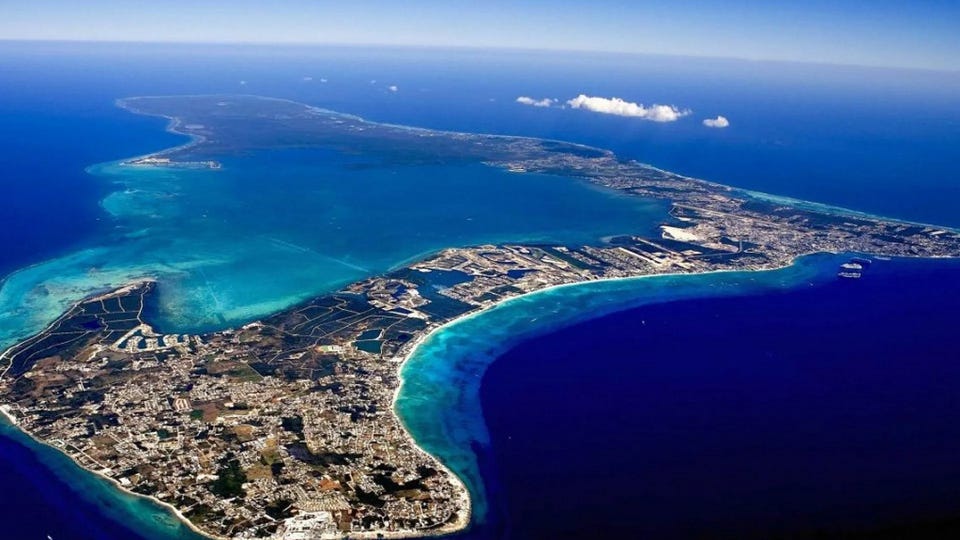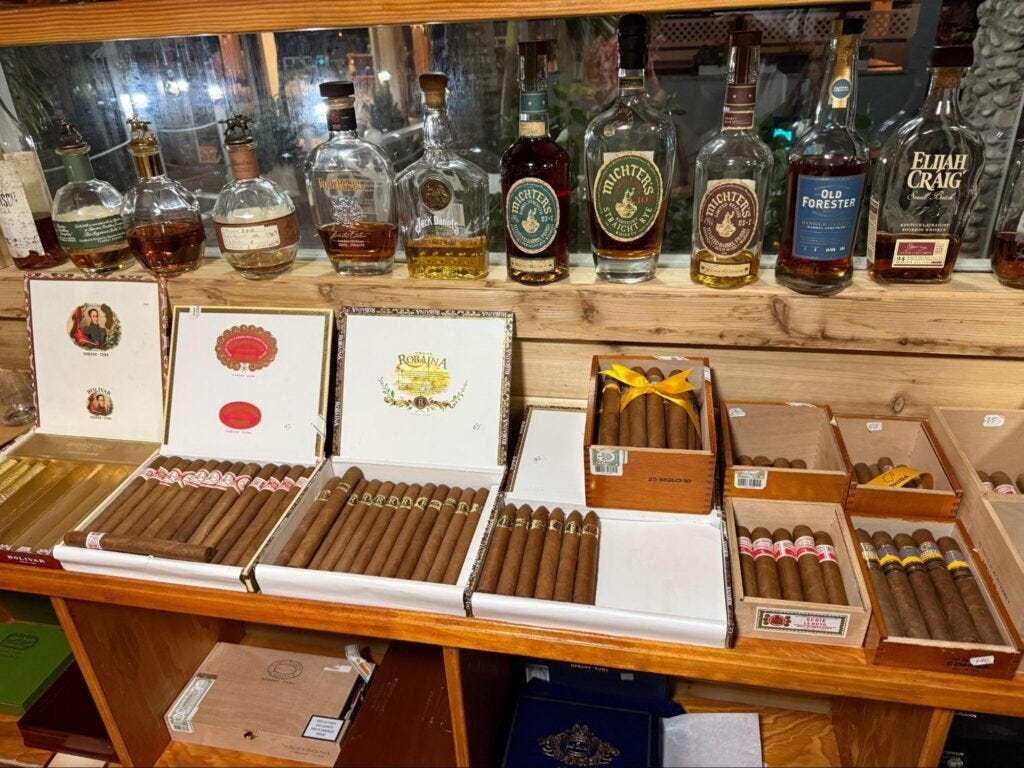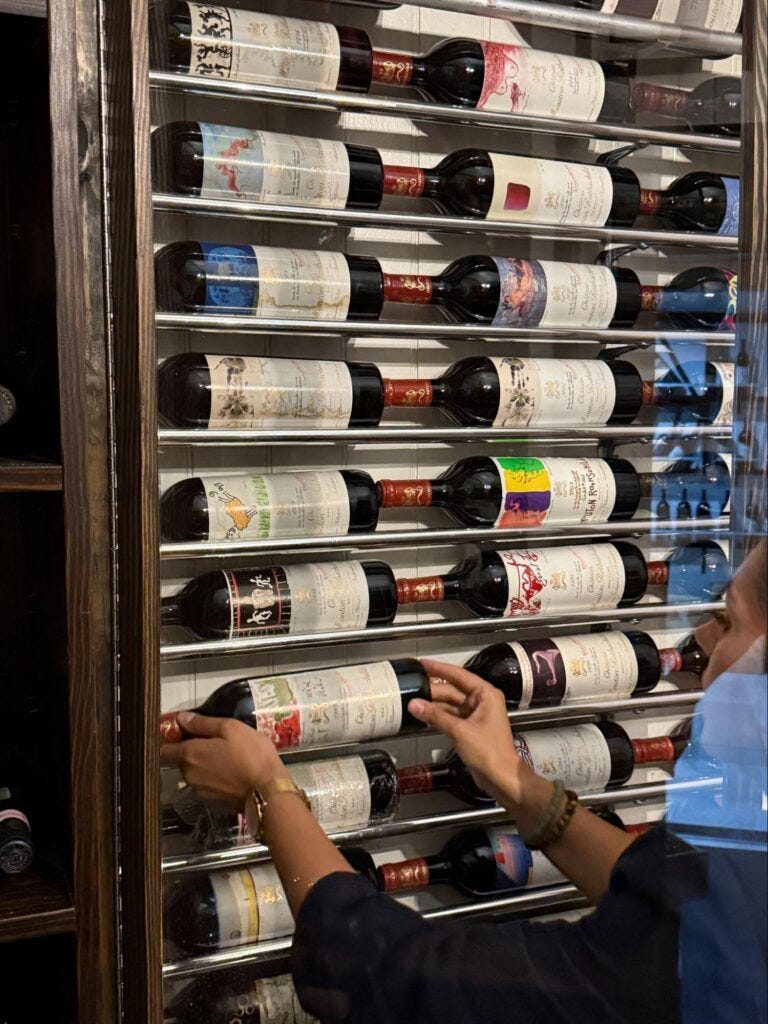Insider Newsletter: Issue #313
Geopolitical capital is fleeing, oil may be mispriced, and platinum’s plotting a comeback...but wait till you see what’s quietly booming in Greece… Ready to connect the dots?
Greetings, friends!
We have this beauty from our fellow member Royce’s house in Huatulco, Mexico.
Then there’s this one from member Rob at Gower Point in Gibsons, looking west towards Vancouver Island.
And from Andrew flying into Sydney (those are clouds below).
The Mighty and Mysterious Cayman Islands
We just spent the last week or so in the Cayman Islands attending the latest Mavericks conference (in between the usual activities one indulges in).
It is hard to get lost there….
And it’s rather easy to find a fine Cuban cigar and a chug of whiskey or rum to reflect on life.
Cuban cigars abound… but they are no bargain (I only bought a few, not the whole box). The prices are in Cayman Island dollars, so add 25% to get to a USD price. And fine Cuban rums… But at US$200 a tot (and more), all I did was admire them.
And a fine selection of wines, although I didn’t even ask as to the price.
A favourite was a rustic cafe called Czech Inn, where we enjoyed reasonably priced beer and great street food.
Given that we were there, I thought I’d share some additional thoughts on this cluster of islands in the sun. The Cayman Islands has seen significant growth in fund registrations and assets under management (AUM) over recent years, to the extent that it is now definitely the primary premier offshore financial centre. Some data points:
As of today, Cayman hosts over 27,000 regulated investment funds, including hedge funds, private equity vehicles, and mutual funds.
They’ve trillions in AUM, with continued year-on-year increases, particularly in private credit, digital assets, and hedge funds.
It is attracting capital for three simple reasons:
Tax Neutrality: Cayman imposes no direct taxes on income, capital gains, or corporate profits, making it appealing for wealth preservation and intergenerational planning.
Flexible Regulation: While regulated, Cayman offers streamlined compliance and fund structuring options.
Sophisticated legal and financial ecosystem: Top-tier law firms, auditors, and fund administrators operate locally, ensuring institutional-grade infrastructure.
And then the big one that is impacting not just this little group of islands but other similar locations around the world such as Dubai, Abu Dhabi, BVI — all experiencing an influx of capital that I call geopolitical capital flight.
It isn’t so much that the Cayman Islands is so wonderful, but rather that so many other parts of the world have taken a communist pill and accelerated the stealing of their citizens’ assets. In a land of the blind a one eyed man is indeed king.
Surprise, surprise, there are increasingly wealthy individuals in Europe and North America fleeing the communists in the EU and reallocating capital offshore, driven by:
Surging sovereign debt and rising taxation risk in G7 economies.
Concerns over political overreach, banking system fragility, and civil unrest.
Fear of capital controls, especially in the context of central bank digital currencies (CBDCs) and declining trust in Western institutions.
Cayman is seen as a neutral, dollar-linked haven with strong rule of law and a history of protecting client confidentiality (within legal bounds).
The Caymans used to be notorious for its dodgy clientele secrecy. This is no longer quite the case. Sadly, it has fallen to the insanity of all the acronym soup misnamed “transparency initiatives” such as FATCA, CRS, and AML regimes.
Despite these increased reporting requirements, it remains attractive because it offers a less worse setup than elsewhere. What’s most attractive is legal clarity, operational efficiency, and a perception of greater asset security.
The key takeaways for me here are that the growth of funds in the Cayman Islands reflects a broader trend: wealth is moving away from politically unstable or over-regulated regions toward jurisdictions perceived as financially sovereign, geopolitically neutral, and structurally sound.
In that sense, Cayman stands out not just as a tax haven, but as a strategic base for capital protection in an increasingly uncertain global landscape.
The Dying Empire Strikes
The time to position for calamity is before, not after. The time to buy insurance is before fire engulfs your home, not after. We have talked before about Iran, Israel, the greater Israel project (no, it’s not antisemitic to highlight risk, ideology, and facts). Secondly, this is what happens at the end of empires. It is to be expected. All that aside, the question to ask is, what does this mean for our portfolio? While we can’t control any outcome here, we can control where and how we invest our capital.
Our views and application of our views on oil/energy were never based on political outcomes in the Middle East. However, conflict in this region based on Israel’s well-documented expansionist views was a matter of when, not if. As such, we did find it bizarre that there was no premium placed on the price of oil. So by buying an oil service company like TechnipFMC or a producer like Exxon, there was a “free option” on hell breaking out in the Middle East (however you define “hell breaking out”).
My friend Alex Krainer wrote an excellent and detailed article on the topic. I encourage you to read it here.
Our job, as mentioned, is to allocate capital, so…
We ask the question, at $75, how much of a “Middle East political premium” is now embedded into WTI? Probably not too much, especially if the conflict is just getting into gear. This begs the question, how far will the conflict go and what effect will it have on the supply of oil coming out of Iran? We simply don’t know!
Perhaps we see oil trade above $100 before year end, but we aren’t making any changes to our positioning. We’re already positioned for chaos and conflict — the proverbial insurance before the fire.
Tariffs Blocked
In mid-April (during the tariff tantrum), we wrote about how the mighty US Constitution specifically prohibited the US President from raising taxes on US citizens. There was talk about this on the fringes, notably from economist Jeffery Sachs, but we didn’t hear squat from the press of popular opinion (being the lizards they are).
The thinking of the vast majority of market commentators and a good few fund managers to boot was a repeat of the 2008 GFC or something akin to that.
Well, lookie here…
A U.S. trade court on Wednesday blocked President Donald Trump’s tariffs from going into effect, ruling that the president overstepped his authority by imposing across-the-board duties on imports from nations that sell more to the United States than they buy.
The Manhattan-based Court of International Trade said the U.S. Constitution gives Congress exclusive authority to regulate commerce with other countries that is not overridden by the president’s emergency powers to safeguard the U.S. economy.
At the time we mentioned this, we didn’t think this was hard to figure out and we figured that sooner or later these tariffs would be challenged in court.
Moral of the story? Think for yourselves and don’t be led astray by the press of popular opinion. Convid should have taught us all that!
And as for a repeat of the 2008 GFC experience, as we quoted:
We also said during the height of the “tariff tantrum” that if we can find enough value, we will remain fully invested. And if we can’t find enough diverse deep value, then we will have a high allocation to cash.
In the lead up to the 2000-2003 TMT bear market, there was lots of value outside TMT sectors so there was little reason to have a high allocation to cash. In the leadup to the 2008 GFC, everything in the world had gone up significantly in an almost parabolic style. There was little value to be had and a good reason to have a big allocation to cash.
If there was to be a “bear market” we thought (and still think) that it would be more akin to the 2000-2003 TMT bear rather than the 2008 GFC.
Today, we can find tons of value outside the US and especially so in commodity sensitive sectors. As such we find no reason to sell or have a high allocation to cash (or any cash for that matter). We said this some six weeks ago, and we reiterate it today.
To be clear, if we were fully invested in the S&P 500, Nasdaq, and such, we’d be far more likely to sell it all and go to cash… but we’re not and so we won’t.
Circling back to the popular opinion of early April, recall all the pundits talk of a repeat of the 2008 GFC. Do you think that the fear of a repeat of the GFC prevented it from happening again (i.e. caused Trump to postpone his tariffs)?
Remember that famous quote that no one has ever heard of?
The more you look at the future the more it changes because you looked at it, and that changes everything else.
Wouldn’t it be a strange irony that the greatest risk we face isn’t a repeat of the GFC but rather the unintended consequences or side effects of all the measures taken to prevent another 2008 GFC?















